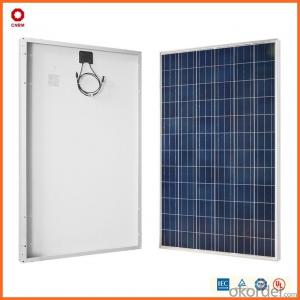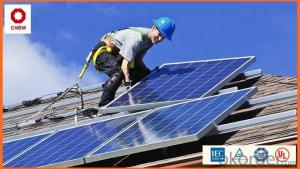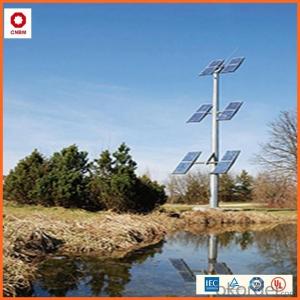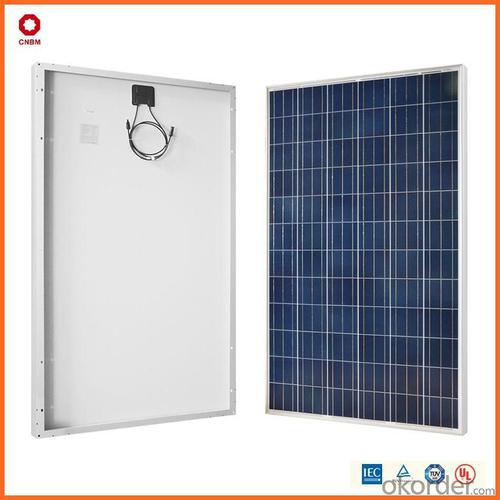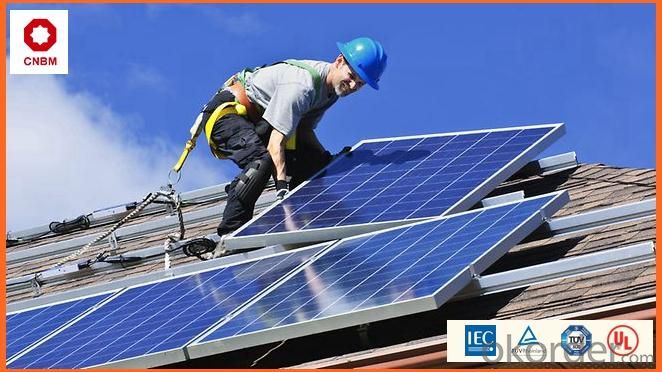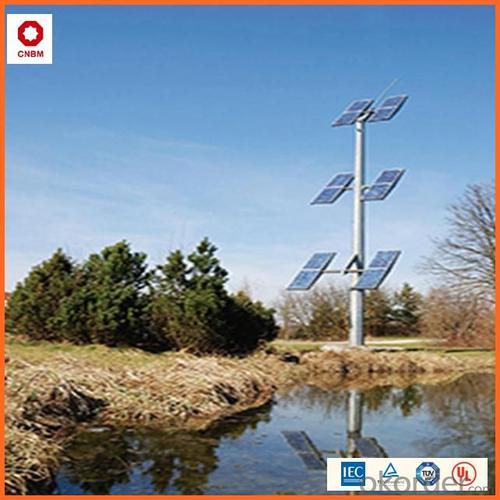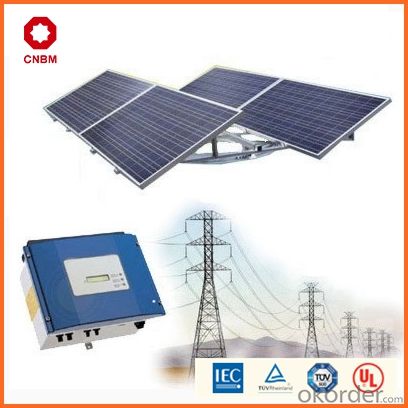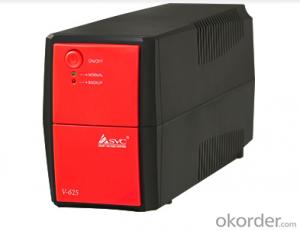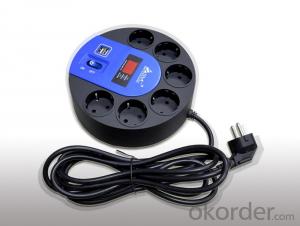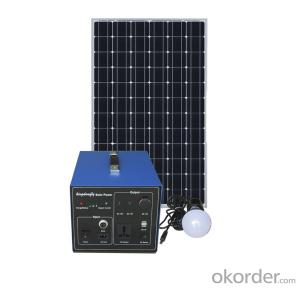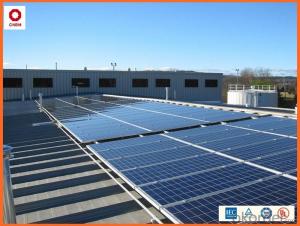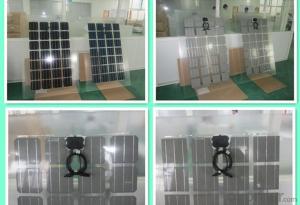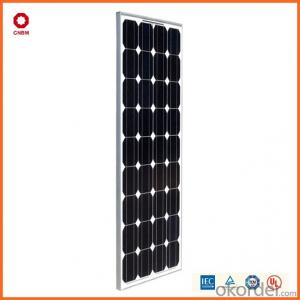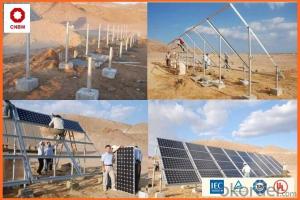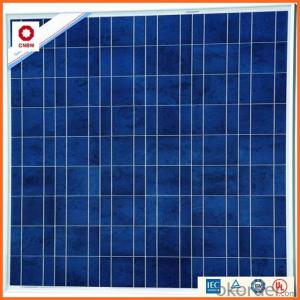Wind and Solar Energy Systems - 50w Small Solar Panels in Stock China Manufacturer
- Loading Port:
- China main port
- Payment Terms:
- TT OR LC
- Min Order Qty:
- 1 watt
- Supply Capability:
- 10000000 watt/month
OKorder Service Pledge
OKorder Financial Service
You Might Also Like
Specification
Product Description:
Hot Sale !!! Quality and Safety of Small Poly Solar Panel 5w~150w
1. Rigorous quality control meets the highest international standards.
2. High-transmissivity low-iron tempered glass, strong aluminium frame.
3. Using UV-resistant silicon.
4. IS09001/14001/CE/TUV/UL
Warranties of Small Poly Solar Panel 35~85w
1. 10 years limited product warranty
2. 15 years at 90% of the minimal rated power output
3. 25 years at 80% of the minimal rated power output
Specification
Characteristics of Poly solar panels CNBM (245-320W) | |||||
Max Power Voltage Vmp(V) | 30.3 | 30.8 | 31.1 | 31.4 | 31.85 |
Max Power Current Imp(A) | 7.60 | 7.64 | 7.73 | 7.81 | 7.85 |
Open Circuit Voltage Voc(V) | 36.1 | 36.6 | 37 | 37.3 | 37.68 |
Short Circuit Current Isc(A) | 8.50 | 8.55 | 8.65 | 8.75 | 8.85 |
Max Power Pm(W) | 230W | 235W | 240W | 245W | 250W |
Temperature Coefficient of Cells Poly solar panels CNBM (245-320W) | |
NOCT | 45± 2 |
Temperature Coeffucients of Isc | 0.0492 |
Temperature Coeffucients of Voc | -0.3374 |
Temperature Coeffucients of Voc | -0.4677 |
Mechanical Data of Poly solar panels CNBM (245-320W) | |
Dimension | 1638 × 982 × 40 mm |
Weight | 19.5 kg |
No. of Cells and Connections | 60 (6 ×10) |
Tolerance | 0 ~ + 5 W |
Cell | Monocrystalline Cell 156 × 156 mm |
Packing | 624 Pcs/40ft(H) Container |
Limits of Poly solar panels CNBM (245-320W) | |
Operating Temperature | -40 to +85 |
Storage Temperature | -40 to +85 |
Max System Voltage | 1000VDC(IEC) / 600VDC(UL) |
Features of our products:
• High conversion efficiency mono/poly-crystalline amorphous silicon solar cells
• Modules incorporate high performance bypass diodes to minimize the power drop caused by shading
• High transmittance, low-iron tempered glass
• High performance EVA encapsulant to prevent destroying and water.
• AI frame: without screw, corner connection. 8 holes on the frame can be installed easily
• Good performance of preventing from atrocious weather such as wind and hails
• Certifications: CE IEC TUV VDE UL, Class I
• 10 years 90% power output warranty

Shipping of Small Poly Solar Panel 35~85w
By Sea | Delivery from Shanghai or Ningbo seaport |
By Air | Departure from Shanghai Pudong Airport |
By Express | Post by DHL, EMS, UPS, TNT. |
Features of our products:
• High conversion efficiency mono/poly-crystalline amorphous silicon solar cells
• Modules incorporate high performance bypass diodes to minimize the power drop caused by shading
• High transmittance, low-iron tempered glass
• High performance EVA encapsulant to prevent destroying and water.
• AI frame: without screw, corner connection. 8 holes on the frame can be installed easily
• Good performance of preventing from atrocious weather such as wind and hails
• Certifications: CE IEC TUV VDE UL, Class I
• 10 years 90% power output warranty
As a professional Solar Panel manufacturer and Supplier in China, we have our customers come around the whole world and our specialization has got a worldwide recognition. Meanwhile, with our superior quality, competitive price, prompt and excellent service, As main role in trade section of CNBM Group, CNBM International Corporation supplies products including Monocrystalline Solar Panel, Polycrystalline Solar Panel ( multicrystalline silicon Solar Panel) have received and enjoyed famous reputation in many countries and regions in the world.
- Q: Can solar energy systems be used in powering movie theaters or entertainment venues?
- Certainly, movie theaters and entertainment venues can absolutely utilize solar energy systems to provide power. The operation of these venues requires a substantial amount of electricity for their lighting, sound systems, projectors, and other equipment. Solar energy systems have the ability to generate clean and renewable electricity by harnessing the sun's power. By installing solar panels on the roofs or in the surrounding areas of these venues, they can generate a significant amount of electricity to fulfill their energy requirements. Not only can solar energy systems be designed to supply power for the basic infrastructure of movie theaters or entertainment venues, but they can also support additional energy-intensive features such as HVAC systems, concession stands, and even electric vehicle charging stations. By utilizing solar energy, these venues can greatly reduce their dependence on grid electricity, decrease operational expenses, and contribute to a more sustainable and environmentally friendly future. Besides the practical advantages, the installation of solar energy systems in movie theaters or entertainment venues can also serve as a demonstration of environmental responsibility and attract environmentally conscious audiences. Many individuals are becoming increasingly aware of the significance of renewable energy, and by showcasing their commitment to sustainability, these venues can enhance their brand image and appeal to a wider customer base. In conclusion, the utilization of solar energy systems to power movie theaters or entertainment venues is not only technically viable but also financially and environmentally beneficial. By harnessing the sun's power, these venues can diminish their carbon footprint, save on energy costs, and contribute to a greener future for the entertainment industry.
- Q: Are there any noise concerns with solar energy systems?
- Yes, there are generally no noise concerns with solar energy systems as they do not have any moving parts and operate silently.
- Q: Can a solar energy system be installed on a carport or parking lot?
- Yes, a solar energy system can be installed on a carport or parking lot. In fact, carports and parking lots are ideal locations for solar panel installations as they provide ample space and can generate clean energy while also providing shade and protection for vehicles. This also allows for dual use of the space, making it a cost-effective and sustainable solution for generating renewable energy.
- Q: What is the impact of air pollution on solar panel efficiency?
- Air pollution has a negative impact on solar panel efficiency as it reduces the amount of sunlight reaching the panels, thereby decreasing their energy generation capacity. Dust, smog, and other particles in the air create a layer on the surface of the panels, hindering the absorption of sunlight. Regular cleaning and maintenance are required to ensure optimal efficiency and performance of solar panels in areas with high air pollution.
- Q: How is solar energy stored for later use?
- Various methods exist for storing solar energy for later use. One widely employed approach involves the utilization of solar batteries or energy storage systems. These batteries become charged during daylight hours, when excess solar energy is being generated. Subsequently, the stored energy can be utilized during periods of limited or no sunlight, such as nighttime or cloudy days. An alternative means of storing solar energy is through the adoption of thermal energy storage systems. These systems convert solar energy into thermal energy, which is then stored in a medium like water or molten salt. This stored thermal energy can subsequently be utilized to produce electricity or heat whenever necessary. Moreover, solar energy can be indirectly stored through the utilization of pumped hydroelectric storage. Excess solar energy is employed to pump water from a lower reservoir to a higher one. When electricity is required, the stored water is released and flows down to a lower reservoir, generating electricity via turbines. In addition, solar energy can also be stored in the form of compressed air. Excess solar energy is utilized to compress air into storage containers. When electricity is needed, the compressed air is released and expanded through turbines, generating electricity. In conclusion, the storage of solar energy for future use plays a critical role in ensuring a consistent and uninterrupted power supply. These storage methods enable us to maximize the advantages of solar energy and overcome the challenges posed by its intermittent availability.
- Q: Can solar energy systems be used in powering art galleries or museums?
- Yes, solar energy systems can definitely be used to power art galleries or museums. In fact, utilizing solar power in these establishments can have numerous benefits. Firstly, art galleries and museums often have large spaces with extensive lighting systems, making them energy-intensive. Solar energy systems can provide a significant amount of electricity to power these spaces, reducing reliance on traditional energy sources and lowering operating costs. Moreover, using solar energy aligns with the environmental values often associated with art and culture. By utilizing clean, renewable energy, art galleries and museums can significantly reduce their carbon footprint and contribute to the global efforts in combating climate change. Solar energy systems can also provide a reliable source of power, especially during peak hours when galleries and museums typically experience high visitor footfall. Additionally, the installation of solar panels on the rooftops of these establishments can serve as a visual symbol of their commitment to sustainability and inspire visitors to adopt similar practices in their own lives. However, it is important to note that the feasibility of solar energy systems in art galleries or museums may vary depending on various factors such as the available roof space for solar panel installation, the geographical location, and the specific energy requirements of the establishment. Conducting a thorough assessment and feasibility study is crucial to determine the optimal size and configuration of the solar energy system for each individual gallery or museum. Overall, solar energy systems can provide a clean, renewable, and cost-effective solution for powering art galleries and museums, aligning their operations with sustainable practices while reducing their environmental impact.
- Q: Can solar energy systems be used in areas with limited access to sanitation facilities?
- Yes, solar energy systems can be used in areas with limited access to sanitation facilities. Solar energy systems, such as solar panels, can provide electricity to power water pumps, filtration systems, or other sanitation equipment. This can help improve access to clean water and sanitation in areas that lack traditional infrastructure. Additionally, solar energy systems can operate independently of the grid, making them suitable for remote or off-grid locations without access to reliable sanitation facilities.
- Q: Can solar energy systems be used in powering wineries or breweries?
- Yes, solar energy systems can be used to power wineries or breweries. Solar panels can be installed on the roofs of the buildings or in nearby open areas to generate clean and renewable electricity. This can help wineries and breweries reduce their dependence on fossil fuels, lower their energy costs, and contribute to a more sustainable and environmentally-friendly operation.
- Q: Can solar energy systems be used in areas with frequent cloud cover?
- Yes, solar energy systems can still be used in areas with frequent cloud cover. While cloud cover can reduce the amount of sunlight reaching the solar panels, modern solar energy systems are designed to efficiently harness even indirect sunlight. Additionally, advancements in technology, such as the use of tracking systems and more efficient panels, have made it possible to generate electricity from solar energy even in areas with less consistent sunlight.
- Q: Can solar energy systems be easily expanded or upgraded?
- Yes, solar energy systems can be easily expanded or upgraded. One of the major advantages of solar technology is its modular nature, allowing for scalability and flexibility. If you have additional space available, you can simply add more solar panels to increase the capacity of your system. Additionally, advancements in solar technology have made it easier to integrate new panels with existing systems. Upgrading a solar energy system can also be done by replacing older or less efficient components with newer and more efficient ones, such as upgrading to higher capacity inverters or adding battery storage for energy storage purposes. The expandability and upgradability of solar energy systems make them a cost-effective and sustainable choice for meeting increasing energy demands over time.
Send your message to us
Wind and Solar Energy Systems - 50w Small Solar Panels in Stock China Manufacturer
- Loading Port:
- China main port
- Payment Terms:
- TT OR LC
- Min Order Qty:
- 1 watt
- Supply Capability:
- 10000000 watt/month
OKorder Service Pledge
OKorder Financial Service
Similar products
Hot products
Hot Searches
Related keywords
